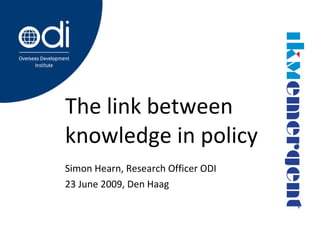
The Link Between Knowledge And Policy
- 1. The link between knowledge in policy Simon Hearn, Research Officer ODI 23 June 2009, Den Haag
- 3. Source: DEFRA (2006) Our Approach to Evidence and Innovation
- 4. Policy processes are... Monitoring and Evaluation Agenda Setting Decision Making Policy Implementation Policy Formulation Civil Society Donors Cabinet Parliament Ministries Private Sector
- 6. three models
- 7. actors and networks DFID Social Development Advisor Ethiopia Employers Association Head of PRSP Technical Committee in Min. of Finance & Econ. Head of Social & Labour Affairs, Congressional Standing Committee UNICEF Economic Policy Advisor Children & Youth Bureau Head, Ministry of Children & Youth Children's Rights Club Representative Save the Children UK, Economic & Poverty Policy Officer Policy Division Head, Ministry of Education Kebele Women's Association Federation Officer Amhara School PTA Representative Amhara Regional State Budget Office Head Key Type of flow Expertise Funding Information Lobbying Regulations Scrutiny
- 9. discourse
- 10. sources of knowledge for policy
- 11. research
- 12. process
- 13. voice, participation and citizen knowledge
- 14. multiple sources and interdisciplinarity
Editor's Notes
- Three paradigms (starting assumptions) well documented – all writing on knowledge and policy falls into one of three Not distinct
- Rational model: - logic of information – knowledge inspires and guides policy - knowledge outside and independent of politics - reason rules – choices of which knowledge to use are based on logic - e.g. DEFRA model of evidence-based policy process
- Pluralism and opportunism - challenges the rationality of the policy process: policy-making not necessarily linear “pragmatic decisions made in uncertainty” - flow of knowledge not taken for granted – opportunistic and dependent on efforts of actors - the worlds of knowledge generation and policy-making are intertwined - assumption that incorporation of knowledge is generally ‘good’ - e.g. Innovation systems – supply and demand, intermediaries, regulatory frameworks. Assumes promotion of knowledge uptake leads to social and economic benefits. - literature is solution oriented
- Politics and legitimisation - power imposes itself on knowledge (reverse of the logical paradigm) - throughout the process, from generation and translation to uptake and use – politics is influencing - knowledge reflects and sustains existing power structures and imbalances - knowledge is a tool of politics and rather than informing decisions, is used to add legitimacy to political decisions after the fact - the legitimacy of knowledge itself is politically determined - literature focuses on problems but no solutions
- Most recent set of theories – based on third paradigm How does power shape the interface between knowledge and policy Three overlapping categories
- Actors: - Policy driven by material political economy - networks, alliances, coalitions of actors form to protect or advance sets of interests - policy-making involves processes of construction of such groups and interaction, negotiation and bargaining between them. - knowledge subordinate to interests in policy processes - knowledge is ammunition ‘pragmatic and flexible epistemology’ - this perspective highlights importance of analysing the flow of knowledge – where and by whom it is deployed and what is the motivation
- Institutions: - formal and informal customs, patterns of behaviour and action - rules of the game – constitutional rules, cultural norms - this perspective focuses on structure as opposed to agency - explicit, implicit and tacit ‘rules’ shape the policy process and political behaviour by defining who is able to participate in different decision-making processes - ideas are translated, refracted and altered to fit prevailing institutions - gate keepers, silo holders, veto players - subtle bureaucratic processes - informal – leads into discourses - links with actors (structures and agents)
- Discourse: - discourse = concepts and ideas relevant for policy and process of communication and policy formulation - discursive structures – concepts, metaphors, linguistic codes, rules of logic, ideas, values, framing of issues - knowledge and power is intertwined - the way knowledge is used is a tool for power - way of bringing together actors and institutions
- The literarure covered a lot about the production of knowledge. We can recognise 4 areas that are advocated as key sources of knowledge for policy
